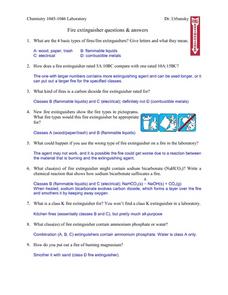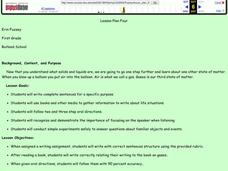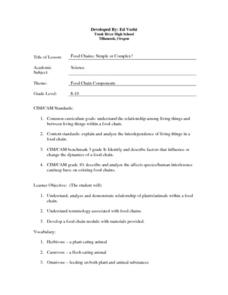Curated OER
Sky Watching
Students complete night-sky observations to understand how our knowledge of the sky has been enhanced by telescopes. Students complete a timeline worksheet giving the history of telescopes. Students then then make their own observations...
Curated OER
Malaria Introduction
Learners analyze three different strategies for controlling the spread of malaria. They examine the disease and how people catch it. Learners explore the life cycle of the malaria parasite.
Curated OER
Habitats
Students examine how different living things interact with their environment. As a class, they discuss the characteristics of a habitat and write the list on the board. In groups, they focus on one habitat and create a mural of the...
Curated OER
Chemistry of Fire
In this science worksheet, students are involved in questions about the events that cause and sustain fires. The chemistry of fire is the primary focus.
Curated OER
Quiz: Name the Constellation
In this science worksheet, 3rd graders will focus on the stars and their constellations. Students will respond to ten questions, naming the constellation that is described in each.
Curated OER
Brainstorming and Creating a Graphic Organizer Using Kidspiration
Although focused on the winter ecology at Crater Lake, this lesson plan could be tweaked to use as a exploration of any region. After a visit to Crater Lake, learners discuss topics relating to winter in this area, such as the behavior...
Curated OER
Magnificent Microscopes Unit Including Mystery and Alternative Assessment Activity
After drawing and labelling a microscope, forensic science explorers use one to solve a simulated murder mystery. They examine each piece of evidence and draw what they observe at each magnification. Working in groups of four, your...
Curated OER
Organizing Principles of Plants and Animals
Three lessons and five assessments are contained in this material. Various paper shapes are sorted as a simulation of biological classification. Learners gather a list of living things that they are familiar with and design a...
Curated OER
What's Your Temperature?
Learners take a look at the local newspaper and focus on the weather section. They get into small groups, and each one looks at the same map, but of a different part of the country. They must prepare a presentation that shows how...
Curated OER
The Female Reproductive System
Students research female reproductive issues. They create a presentation, in small groups, that focuses on one particular helath issue involving the female repro=ductive system.
Curated OER
Matter
First graders are read a story about the various stages of matter with a focus on gases. Using a ziploc bag, they capture as much air as possible and discuss how it takes up space even though it is invisible. To end the lesson plan, they...
Curated OER
Chemistry: Section Review
Review the 5 branches of chemistry and related terms with this worksheet. The focus of these activities is on terms and definitions. Learners answer questions about the study of chemistry, reasons to study chemistry, and pure and applied...
Alabama Learning Exchange
Heads, Shoulders, Knees, and Toes
The identification of various parts of the human body is the focus of this biology lesson plan. Young scientists sing the song "Head, Shoulders, Knees, and Toes," and trace the human body onto butcher paper. Additionally, they label the...
Curated OER
Wildlife Conservation I
Focusing on the wildlife in their area, learners identify endangered and threatened species and what these animals need to survive. While this activity involves animals in the Long Island area, it could be adapted for use with any area.
Curated OER
A Little Chemistry
The molecular properties of water are the focus of this chemistry-based assignment. Multiple-choice, true-or-false, matching, and fill-in-the-chart style questions query assignees about the forces that hold the water molecule together,...
Curated OER
Food Chains: Simple or Complex?
Students explore the relationships within the food chain between plants and animals. They construct modules of food chains, keeping them simple and not complex. They focus on what the animals eat and not on what eats it.
Curated OER
I Wonder How Manduca Breathe
Young scholars observe a Manduca bug as it is dropped in a glass of water and hypothesise how it breathes. They compare this to how humans and other creatures breathe and record their findings in their science journal.
Curated OER
Urban Ecosystems 4: Metabolism of Urban Ecosystems
Cities are compared to living, breathing, metabolizing organisms. Fourth in a five-part series of lessons, this one focuses on the flow of materials through a city. Links to interesting websites and images make your delivery of...
Curated OER
Rocks Worksheet #2
Topping the page is a chart of crystal size and mineral composition of several different igneous rocks. Geology whizzes answer five multiple choice questions after analyzing the information in the chart. This is a simple, but sufficient...
Curated OER
The Hat
Honing reading and communication skills through the theme of farm animals is the focus of this lesson. Students read a book about Scandinavian farm animals and complete prediction journal activities. They complete a worksheet about the...
Curated OER
Egg Words Crossword Puzzle
This crossword puzzle is all about eggs! Learners use the given clues to fill in the squares in the puzzle. Since this is an online interactive resource, immediate feedback is available; although it only tells you whether you are wrong...
Curated OER
Atomic Mass of Candium
By focusing on "Candium", pupils can work through this guide to learn more about different isotopes. The teacher will supply M&M's, Skittles and Reeses Pieces to provide data about mass and abundance.
Curated OER
Up the Down Tree House
Learners investigate the decomposition process. In this ecology lesson, students participate in a play, "Up the Treehouse" where the main idea focuses on a decomposing tree and how food chains are effected by decomposition. After the...
Curated OER
Oil Well That Ends Well
Focusing on the effect of oil spills on the environment, learners conduct experiments to explore this issue. First, they create an ocean environment using materials provided. Then, they make a simulated crude oil substance from vegetable...

























